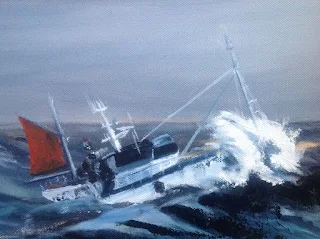Cornwall's sardine ring netting fleet has been an established part of the local fishing industry and the county's coastal heritage for hundreds of years. But members of the fishery expressed concern after EU bodies proposed to include ring netters under controversial landing obligation laws, starting from 2019.
Fisheries minister and MP for Redruth and Camborne, George Eustice, took the issue up with the European Union's fisheries committee and has now confirmed the fleet will be exempt.
Cornish sardines landed in Newlyn
"I'm delighted that by listening to the best available science we've been able to secure an exemption to the discard ban for Cornish ring net fishermen," Mr Eustice said. "Fishermen have been catching sardines off the Cornish coastline for hundreds of years, and the sight of them being offloaded from boats is iconic in Newlyn and Mevagissey. "It's crucial we apply the ban proportionately and take into account sustainable fishing practices and species with a high level of survivability."
The pelagic landing obligation, which comes into force this year, has been drawn up as a replacement for the equally unpopular discard policy. It requires fishermen to "land" all fish caught, regardless of whether they have a quota for the species, rather than throwing them back out to sea.
Industry leaders have warned the policy could prevent boats from going to sea because they risked breaking the law. And from 2019, ring netters were due to be included under the new regulations.
But Mr Eustice said evidence gathered by the Centre for Environment, Fisheries and Aquaculture Science had persuaded EU officials to allow the sardine fishery to continue discarding any accidental catches. "This way we can ensure we strike the right balance between supporting our fishermen and protecting the marine environment for the long term benefit of the industry," he explained.
He did, however, warn that the exemption was "not indefinite" and will be subject to review. He also added it would also depend on other factors, such as crowding densities, remaining constant. The European Union Common Fisheries Policy is a key issues for many of the more Euro-sceptic members of the Conservative party, with many concerned about the negative impact on the UK industry.
This month researchers from the organisation Seafish will conduct a "health check" on fishing in the region, including an analysis of the socio-economic consequences of ongoing changes to management measures.
Full story courtesy of: Cornish Guardian @cornishguardian on Twitter
































